|
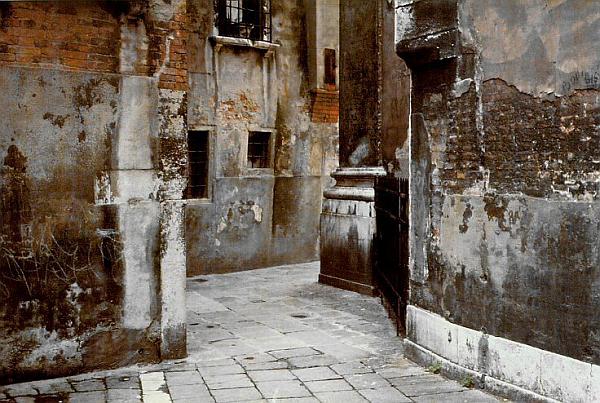
Alley, Venice
1978
Harry Callahan
d. March 15, 1999
1 2 3 4
_______________________
Sun
Michael Palmer
Write this. We have burned all their villages
Write this. We have burned all the villages and the people in them
Write this. We have adopted their customs and their manner of dress
Write this. A word may be shaped like a bed, a basket of tears or an X
In the notebook it says, It is the time of mutations, laughter at jokes,
secrets beyond the boundaries of speech
(....)
Say this. I was born on an island among the dead. I learned language
on this island but did not speak on this island. I am writing to you
from this island. I am writing to the dancers from this island. The
writers do not dance on this island
Say this. There is a sentence in my mouth, there is a chariot in my
mouth. There is a ladder. There is a lamp whose light fills empty
space and a space which swallows light
A word is beside itself. Here the poem is called What Speaking Means
to Say
though I have no memory of my name
Here the poem is called Theory of the Real, its name is Let's Call This,
and its name is called A Wooden Stick. It goes yes-yes, no-no. It goes
one and one
I have been writing a book, not in my native language, about violins
and smoke, lines and dots, free to speak and become the things we
speak, pages which sit up, look around and row resolutely toward
the setting sun
Pages torn from their spines and added to the pyre, so that they will
resemble thought
Pages which accept no ink
...(more)
_______________________
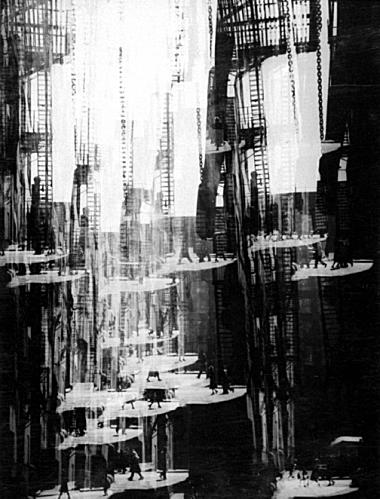
Chicago Alley
Harry Callahan
1948
_______________________
parrhesia :: a journal of critical philosophy
Issue 11, 2011
What Medium Can Mean [pdf]
Jacques Rancičre
translated by Steven Corcoran
(....)... there is yet a third way to conceive the effect produced by the multiplication of apparatuses. Accordingly, the multiplication of instruments is seen less as serving the ends of the arts than it is as the end of means by which different technologies are indifferenciated and lend themselves to realizing an idea of art as despecification. This indifferentiation, however, does not signify the suppression of art in a world of collective energy carrying out the telos of technology. Instead, it implies a neutralization authorizing transfers between the ends, means and materials of different arts, the creation of a specific milieu of experience which is not determined either by the ends of art or by those of technology, but which is organized according to new intersections between arts and technologies, as well as between art and what is not art. The multiplication of apparatuses contributes, then, to creating zones of neutralization wherein technologies are indifferentiated and exchange their effects, where their products present a multiplicity of gazes and readings, of zones of transfer between modes of approaching objects, of the functioning of images and of the attribution of meanings. In this way, mediality can be conceived as that which escapes every teleology of the imperious end or of the means which consumes the end, as that which renews neither an idea of the sovereignty of art, nor one of the dissolution of art in the world of technology. _______________________

Horseneck Beach
Massachusetts
Harry Callahan
C. 1971
_______________________
four poems from Thread
Michael Palmer
Boston Review
So, Alyosha, maybe it is true
that we live in perhaps.
Perhaps the earth . . . perhaps the sky . . .
chemical winds, auroras, tides,
chalk hills and blistered pines
and the microtonal bells.
And those who swallow ink
(the ringers of bells),
perhaps they will inherit
the bogs and salt marshes,
the swamp grass and samphire,
jacket with torn pockets, shredded cuffs.
Will inherit the sea-foam, the dust,
the ferrous mud
that reabsorbs us. ...(more)
Michael Palmer at The Poetry FoundationMichael Palmer at PennSound
Four Kitaj Studies
Michael Palmer Parmentier (17:2, June 2008)
_______________________
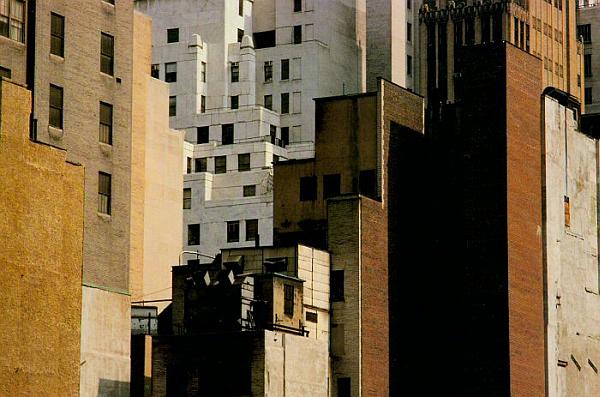
New York, 1978
Harry Callahan
_______________________
Scaling human nature up:
a conversation
Peter Richerson/Charles Wohlforth
in
SCOPE
Winter 2011 - Inaugural issue

Tay river, Perth
photo - mw
_______________________
Kafka, paranoic doubles and the brain:
hypnagogic vs. hyper-reflexive models of disrupted self in neuropsychiatric disorders and anomalous conscious states
Aaron L Mishara
Philosophy, Ethics, and Humanities in Medicine
2010; 5: 13.
Hesitation before rebirth
Stephen Mitchelmore
Mishara's remarkable paper Kafka, paranoic doubles and the brain claims that Kafka suffered from dream-like hallucinations during a sleep-deprived state while writing and that his work "provides data about the structure of the human self. That is, it documents processes "that are not limited to the individual's experience of self in its historical context, nor the individual's 'autobiographical' memory, but reflect the very structure of human self as a transformative process of self-transcendence".(....)
... while documented intimacy is Mishara's concern, for us it can teach us again how to resist dominant contemporary notions of literature as craft, as mastery, as memory, as a record of historical events, as social commentary, as a career, as something less than an impossible letting-go. "In a letter to Max Brod," Mishara notes, "Kafka writes that it is 'not alertness but self-oblivion [that] is the precondition of writing'"....(more)
_______________________
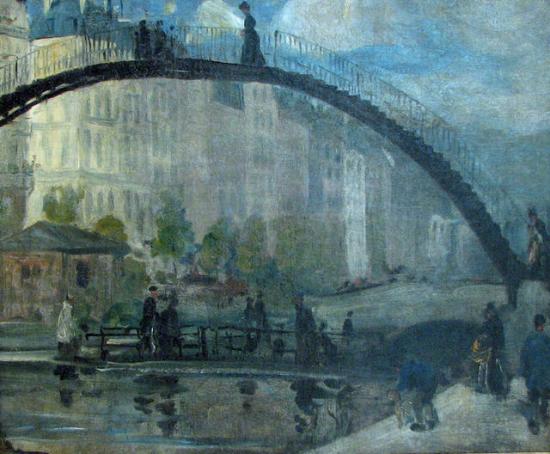
La Villette
1895 ca
William Glackens
(March 13, 1870–May 22, 1938)
_______________________
From the Desk of Roland Barthes
Ben Kafka
Knowledge emerges out of arrangements and rearrangements of paper. Formats and protocols matter. Matter matters. “Insignificance is the locus of true significance. This should never be forgotten,” Barthes tells Rambures. “That is why it seems so important to me to ask a writer about his writing habits, putting things on the most material level, I would even say the most minimal level possible. This is an anti-mythological action.” In their portrayals of the great critic surrounded by the everyday tools and tasks of academia, Le Goff and Cartier-Bresson demonstrate the intellectual generosity as well as the critical potential of the reductio ad minimum that has accompanied the technical turn.
And yet . . . scattered through Barthes’s reflections on his experience of writing we encounter another theme, not quite a subtext, more a pretext, where “pre” means something like the “pre” of Freud’s “preconscious.” Consider the opening paragraph from Barthes’s preface to Roger Druet and Herman Grégoire’s La civilisation de l’écriture (1976):
I have often asked myself why I enjoy writing (manually, that is) to such a great extent that usually the pleasure of having a nice sheet of paper and a good pen in front of me (as if it were the work bench of the bricoleur) makes up for the often thankless tasks of intellectual labor. Even as I reflect on what I should write (as is happening at this very moment), I feel my hand move, turn, connect, dive, rise, and often enough, as I make my corrections, erase or even obliterate a line. This field expands until it reaches the margins, thus creating, out of seemingly functional and minuscule traces (letters), a space which is quite simply that of art. I am an artist, not because I represent an object, but more fundamentally, because, as I write, my body shudders [jouit] with the pleasure of marking itself, inscribing itself, rhythmically, on the virgin surface (virginity being the infinitely possible). . . . Writing is not only a technical activity, it is also a bodily practice of jouissance. ...(more)
_______________________

Diane Arbus
b. March 14, 1923
Self-Portrait
_______________________
The Secret Library of Hope
12 Books to Stiffen Your Resolve
Rebecca Solnit
Hope is an orientation, a way of scanning the wall for cracks -- or building ladders -- rather than staring at its obdurate expanse. It's a worldview, but one informed by experience and the knowledge that people have power; that the power people possess matters; that change has been made by populist movements and dedicated individuals in the past; and that it will be again.
Here, then, are some of the regulars in my secret political library of hope, along with some new candidates:...(more)
_______________________
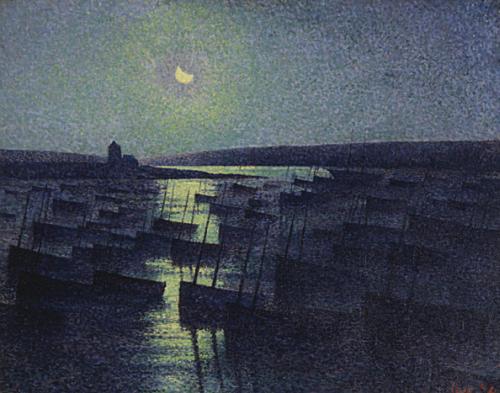
Camaret
Moonlight and Fishing Boats
1894
Maximilien Luce
(March 13, 1858 – February 6, 1941)
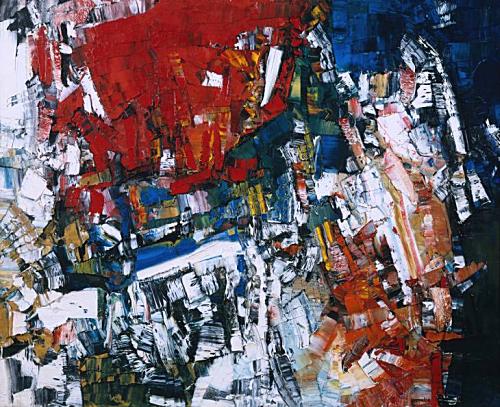
Perspectives
1956
Jean-Paul Riopelle
d. March 12, 2002
_______________________
The Cold Green Element
Irving Layton
At the end of the garden walk
the wind and its satellite wait for me;
their meaning I will not know
until I go there,
but the black-hatted undertaker
who, passing, saw my heart beating in the grass,
is also going there. Hi, I tell him,
a great squall in the Pacific blew a dead poet
out of the water,
Crowds depart daily to see it, and return
with grimaces and incomprehension;
if its limbs twitched in the air
they would sit at its feet
peeling their oranges.
And turning over I embrace like a lover
the trunk of a tree, one of those
for whom the lightning was too much
and grew a brillant
hunchback with a crown of leaves.
The ailments escaped from the labels
of medicine bottles and all fled to the wind;
I’ve seen myself lately in the eyes
of old women,
spent streams mourning my manhood,
in whose old pupils the sun became
a bloodsmear on broad catalpa leaves
and hanging from ancient twigs,
my murdered selves
sparked the air like muted collisions
of fruit. A black dog howls down my blood,
a black dog with yellow eyes;
he too by someone’s inadvertence
saw the bloodsmear
on the broad catalpa leaves.
But the furies clear a path for me to the worm
who sang for an hour in the throat of a robin,
and misled by the cries of young boys
I am again
a breathless swimmer in that cold green element.
courtesy of Liam Sarsfield, likeadesertprophet.com | Arts Collective

Irving Layton
(March 12, 1912 – January 4, 2006)
photo: Roloff Beny
1981 / Rome
_______________________
Critical Proximity
Cultural Studies Review
Vol 16, No 2 (2010)
Tendrils of Memory: A Journey through Vietnam’s Landscape
Les Horvat
Abstract
While the interdisciplinary field of memory studies is burgeoning, the relationship between creative practice, memory, and landscape, remains open to debate, especially when considered in terms of its validity as anthropological data for ethnographers and social scientists. This article calls for a new approach to landscape and memory that remains sensitive to the notion that photography is able to provide a relevant platform for the re-examination of lived experience. Landscape is positioned as a site for memory and forgetting, and as a cultural construct resonant with the fabric of who we are, who we have been in the past, and offering an indication of who we may be in the future. The importance of creative practice through its many forms is suggested as a well-credentialed means of interpreting lived experience, leading to the proposition that photography has an important role to play in furthering our understanding of cultural history.
_______________________
Marketing, Consumption and Surveillance
Surveillance and Society
Vol 8, No 3 (2011)
_______________________
Contagiontology
Christopher Kullenberg, Karl Palmås
eurozine
Panopticism is waning; panspectrocism is the nascent social diagram that organizes our lives. Heineken and Wal-Mart use pattern recognition and computer-assisted predictions of future behaviours to secure their markets. Google, the panspectric corporation par excellence, tells us that the company wants to know what you'll want to do tomorrow. ...(more)
_______________________
This Is What Class War Looks Like
_______________________
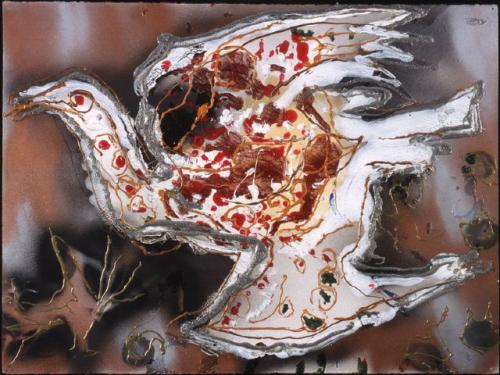
Jean-Paul Riopelle

photo - mw
_______________________
What It's Not
Karen Kevorkian
The day before snow hills crest subatomic, dyed turquoise
of the Indian tourist bracelet, reactor pool
chaos. Wind rattles
coin colored cottonwood
coin of stories told to children not memory’s alloy
coin of light on still water
or when a stranger takes your arm asks tonight where you’ll sleep.
Coin of rejection coin of the quick response
holding onto the coin of silence coin of the empty room
coin of the red wine in the glass.
Country dark is not the well understood city dark
its neon and taillight. Country dark is pitch
never mind the star-gabbling sky.
You can’t buy your way out of it.
...(more)
Karen Kevorkian - Eight Poems
archipelago
_______________________
Writing the new (Vancouver) geography
rob mclennan
Writing of New York poet Brenda Coultas’ “A Bowery Project” (from A Handmade Museum) and Vancouver poet Lisa Robertson’s Occasional Work and Seven Walks from the Office for Soft Architecture in the Australian online journal Jacket, Dallas poet Susan Briante writes:
How does one approach the difficult and compelling task of writing “a poem of a person and a place” (as Olson so mildly put it) in the wake of (among others) The Maximus Poems, as well as (more recently) CD Wright’s stunning take on the Louisiana prison-industrial complex, One Big Self, or Kristen Palm’s recently published volume on Detroit, The Straits, just to name a few? There’s been no shortage of interesting thinking about investigative poetics. And yet, this is no easy time to be a documentary filmmaker, poet or journalist. State censorship has reached what seems like an unprecedented high. The manipulation of language and information on the part of the current administration comes straight out of the pages of science fiction. One high-ranking Bush official chided New York Times reporter Ron Suskin for clinging to the “reality-based community” and went on to explain: “We’re an empire now, and when we act, we create our own reality. And while you’re studying that reality—judiciously, as you will—we’ll act again, creating other new realities…”
I’ve been reeling from all the physical descriptions of Vancouver lately, after recently going through other titles by Vancouver authors, including Oana Avasilichioaei’s feria: a poempark (Toronto ON: Wolsak & Wynn, 2008), Meredith Quartermain’s Nightmarker (Edmonton AB: NeWest Press, 2008), Sachiko Murakami’s The Invisibility Exhibit (Vancouver BC: Talonbooks, 2008) and George Stanley’s Vancouver: A Poem (Vancouver BC: New Star, 2008). What is it about Vancouver these days, or is it something I hadn’t been paying attention to previously, happening all along? Certainly there are other individual examples of full-length or shorter works of poetry that explore different Canadian cities, but somehow none of them compare in sheer number to how Vancouver has been depicted....(more)
Maple Tree Literary Supplement
_______________________
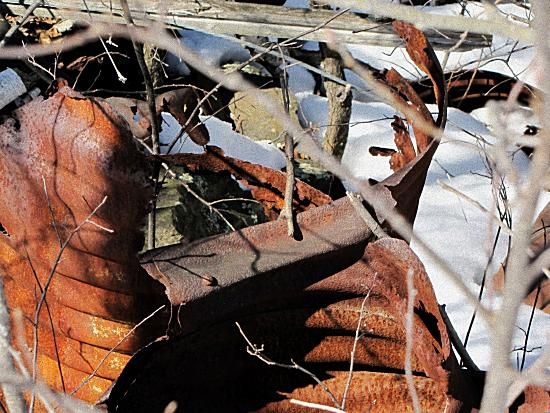
photo - mw
_______________________
Lo Squaderno
Explorations in Space and Society
No. 17 | Crisis, Utopia, Etopia
_______________________
Media Piracy in Emerging Economies
Joe Karaganis (ed.)
The Social Science Research Council
The growth of digital piracy since the mid-1990s has undermined a wide range of media business models, but it has also disrupted this bad market equilibrium and created opportunities in emerging economies for price and service innovations that leverage the new technologies. In our view, the most important question is not whether stronger enforcement can reduce piracy and preserve the existing market structure—our research offers no reassurance on this front—but whether stable cultural and business models can emerge at the low end of these media markets that are capable of addressing the next several billion media consumers. Our country studies provide glimpses of this reinvention as costs of production and distribution decline and as producers and distributors compete and innovate. if the Consumer's Dilemma license is causing you problems an alternate pdf is available at Monoskop/log
_______________________
Progress as Regression
Paul Chan
e-flux
Despite ideological differences, the various factions that make up the political right in America—from the grassroots to the astroturfed to the corporate—have found common ground after Obama’s 2008 victory.1 This ground is the past: an arid patch of mythological land that has become home to a growing organizing effort driven by anti-tax sentiments, elements of nationalism, and a vicious streak against a laundry list of undesirables. This movement only knows one way forward: back....(more)
_______________________
How to Fight Friendly Fascism
Andrew Levine
_______________________
Inequality and Growth: The Role of Beliefs and Culture
Martin Strieborny
Abstract:
Positive shifts in voters’ demand for social equality lead to increases in government interventions. Stronger interventions lower both inequality and economic growth, generating a positive co-movement between them. These dynamics are stronger in countries where people for cultural reasons believe inequality is unfair. The pattern is weaker in countries where a culturally determined belief that the rich are deserving renders equality a less important objective in the first place. I develop this analytical result in a theoretical framework of Alesina and Angeletos (2005), and provide robust empirical support for it in a panel of 38 countries over the period 1964-2004.
_______________________

photo - mw
_______________________
Five Poems
Attila József
translated from Hungarian by Ron A. Kalman and Gabor J. Kalman
exquisite corpse
The Seventh
If in this world you lay a claim,
let seven births be your aim!
Once be born in a burning home,
once in a flood in an icy storm,
once in a clinic where the mad retreat,
once in a field of bending wheat,
once in a cloister with a hollow ring,
once in a sty with a pigsty stink.
The six cry out, but which is key?
You yourself the seventh be!
If out front stands the enemy,
take seven men for company.
One, who starts his day of rest,
one, whose service is the best,
one, who teaches on a whim,
one, whom they threw in to swim,
one, who’s the seed of forestland,
one, whose forebears took a stand,
not enough tripping up and trickery,—
you yourself the seventh be!
...(more)

photo - mw
_______________________
Tops of Birches
Gennady Aigi & Alex Cigale
as though
nothing changed:
oh
stillness—after
whispering
gazing
and hearing—
(and i forgetting it was all life long forgetting the past voiced as a cradle song so as to remember the rest of life the lullaby with its silent-originary spirit primal opening of me a widening it promising me freely without limit)
oh
stillness—(long time already there is no one):
the air—among the tops:
of birches
1983
...(more)
Drunken Boat #13
First Peoples, Plural
Five Poems by Gennady Aigi translated by Anatoly Kudryavitsky
The Poetry and Thought of Gennady AigiSarah Valentine scribd
_______________________
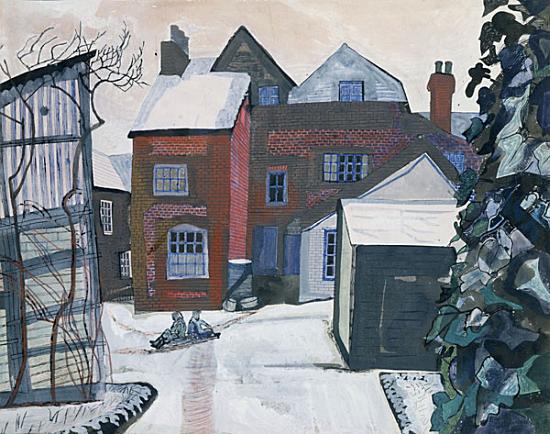
Brick House, Great Bardfield
Edward Bawden
b. March 10, 1903
_______________________
Vernacular Architecture
Elizabeth Willis
Seeing to the creature:
leaning, bending down.
What grass is tendered
in what state of the union?
Any body can be unionized.
A governed love for the people
isn’t special.
The government of love
is to believe itself unwritten.
Love’s office is devotion
to the ungoverned, like justice
somewhere else, in a while.
A school beside its architect.
A child next to a picture.
The family in its tunnels.
Pure products feel their power
to feed the engine.
Their movement a document
that totters into being
written with their elbows
and their hands.
Here is what I found today
or what I am.
Five Poems in the Boston Review
Address by Elizabeth Willis
a review by Abigail Licad
(....)
Willis’ associative leaps and juxtapositions astonish and probe, often testing its reader of his or her own demand of history, art, and current events — one may, as this reader did, bow her head in shame after recognizing only a small number of “witches” in the poem “Blacklist,” which refers to literary and political personalities from Ronald Reagan to Sappho and Maria Tallchief. The book will present a challenge for most readers, even perhaps for those well-versed in language poetry (a strong influence on Willis as she discussed in an interview with Mark Tursi), and I wonder how much any general reader can harvest of the poems their various significations without a strong grasp of avant-garde poetic movements and Willis’ own idiosyncratic research interests....(more)
The Critical Flame
Volume 2, Issue 12 — March-April 2011
_______________________
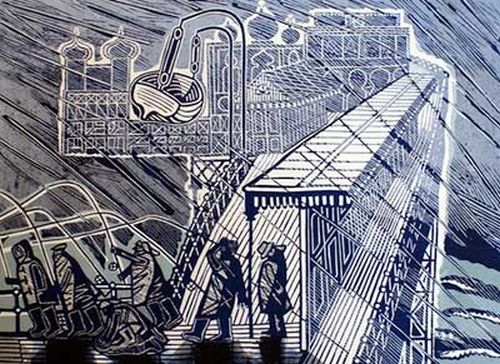
Edward Bawden
_______________________
Glittering Shafts of War
Elizabeth Willis
Lost words are lost boys. These woods are combing the
hair of paradise. You're waking and thinking, an opera of
our minor ways: Sweet William, Virginia. What we fear in
fearlessness turns over the table. You don't blame the lamp
for what you cannot read, the fire in the match not struck.
How many coats, by federal surprise, regard you from the
banks? We think we see them through the screen, the
darkest flower's gabardine
Poems from Meteoric Flowers
Elizabeth Willis
High Chair No. 6
_______________________
Qualitative Studies
Vol 1, No 1 (2010)
associated with the Center for Qualitative Studies at Aalborg University in
Denmark
Perceptions of Power and Democracy: Analytical and Methodological Dilemmas of the Construction of Images
Niels Nųrgaard Kristensen
_______________________
Old Scratch's Tea Party
Joe Palmer
nthposition
The principle that all superstitions are equally valid must be true if all men have the right to choose their governors. - Kilgore Trout
A straight trough of motivation extends from the Puritan Divine Jonathan Edward's sermon, 'Sinners in the Hands of an Angry God' (1741), to the gullible and grasping Tea Partiers, who desperately want to be assured that something, anything, must be true and everlasting in spite of their undeserved but eternal damnation.
Most of the hosts and guests of the Tea Party went to school in the United States, where education follows the German model, with compulsory comprehensive (all subjects) schools, Kindergarten through grade twelve, offering psychotherapy instead of learning as their aim (for example, football takes precedence over literacy, thanks to John Dewey, "the philosopher of freedom," the father of pragmatic and progressive education) because Americans are actively engaged in assimilating several cultures, European, African, American Indian, and so on, in order to produce a common heritage and a way of life they can call their very own. Schools governed by locally elected boards are mirror images of their communities. Teachers must not say anything that offends anyone, or teach anything contrary to anyone's beliefs. When the school boards do not serve special interests, privately funded schools such as segregated Christian academies, Roman Catholic, preparatory, and charter schools fill the need. The entire community must approve the contents of the prescribed textbooks.
Americans believe that the purpose of schooling is to form a more perfect union of individuals who must be shaped to fit into the jigsaw puzzle that every community presents, so every child is taught to pray:
God bless Mommy.
God bless Daddy.
God bless our sociogram.
Their goal in life is to get rich, to belong to the moneyed few, to the elite oligarchy that controls the corporations, which in turn inform the government. They will do anything they can to prevent others from getting ahead of them, a situation resembling life in an old pre-pharmaceutical insane asylum, as portrayed in Sam Fuller's 1963 film Shock Corridor....(more)
_______________________
A look at technological determinism, affect and communicative capitalism
Jodi Dean
Networked cultures and social media are embedded in communicative capitalism, a form of capitalism where communication itself is a productive force. Our words and energies, our opinions and critiques, provide media content, commodified spectacle. The few profit from the words, ideas, and expressions of feeling of the many. To grapple with how contemporary politics is reconfigured, to update radical politics so that it can transform this setting, we must jettison the critical vocabulary of the late sixties and understand how we are political now....(more)
The Paper
_______________________

Boat in Snow
Zagreb,Croatia
Stanko Abad˛ic
2010/2011
1 2 3
_______________________
News of the Fall of Troy
G. C. Waldrep
conjunctions
for & after Anselm Kiefer
(what is important is that history be
silent (for a moment
(we call this attention
(it is one function of Art
(stippled vesicle (rucked plexure
(a new Latin, vantage supplies
its architect (to the eye: not
(inaudible
(the shuffling of chairs
(record the armature
(colonial I mean
(let the animals please stop talking
(the video repeats itself
(we take inventory after the fire
(settle the horizon
(immigration particle
(we are made uncomfortable
when the figures behind the masks
refuse to smile,
there are only so many
memories (inside the earth
(lithosphere
(extravagance
(airlifted, as horses have been
...(more)
_______________________
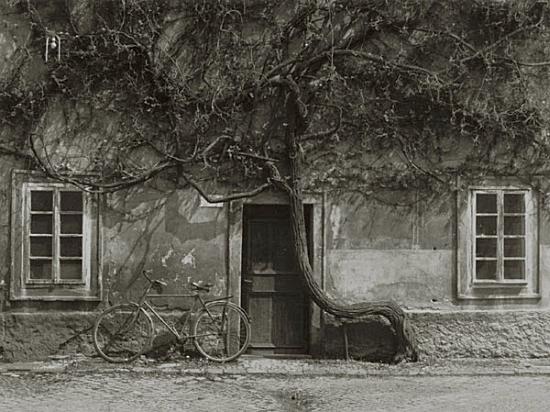
Forgotten Bicycle
Stanko Abad˛ic
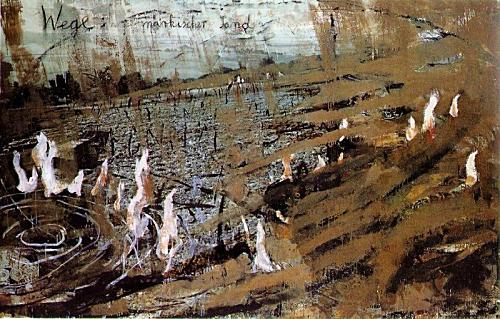
Paths: March Sand
1980
Anselm Kiefer
b. March 8, 1945
_______________________
Liminalities: A Journal of Performance Studies
Vol. 6, No. 2, October 2010
Wandering Through Time: Francis Al˙s’s Paseos and the
Circulation of Performance [pdf]
Chloe Johnston
Liminalities
Here is a fairytale for you
Which is just as good as true
What unfolds will give you passion
Castles on hills & also treason
How, from his cape a fatal thread
To her window the villains led.
— Francis Al˙s
This short poem was printed on the back of a postcard, the place where one might
expect to find a hand-written message from a friend on a trip. The postcards were left
on postcard racks in two locations in the city of Stockholm in 1998: the Stockholm
Museum of Science and Industry, and the Nordic Museum. The front of the card bore
the image of a man, a photograph that appeared to have been altered (digitally or by
hand) so that the colors were intensified and the outlines of the body made blurry and
painterly. The man had his back to the camera and wore a bright blue sweater with a
sleeve unraveling; the thread of the sweater extended from the man’s wrist out of the
frame of the picture, attaching his body to something unseen, maybe another person,
maybe just the path behind him. Perhaps it was the “fatal thread” that led the “villains”
to the window of the woman. Perhaps the story would be continued elsewhere—it
certainly sounded like a beginning.
(....)
In this article, I analyze the narrativization of Francis Al˙s’s performance journeys—urban pedestrian wanderings that he calls paseos (Spanish for walks or strolls). I consider how the mythologies engendered by these walks are themselves creative practices. These mythologies function as a kind of performance history for each walk and for the artist as an individual. The study of performances from the past (especially those that occur without a script or clearly defined theatrical frame) must, by necessity, be understood as a study of the ways those performances have become part of a historical record. The art object cannot travel through time as a painting does, but rather it travels through time via discursive vehicles. Al˙s’s walks are a particularly clear example of these journeys, offering an opportunity to consider the travel routes of performances that are, themselves, travel stories.
_______________________
A Centenary Tribute to Elizabeth Bishop
video
with
Frank Bidart, Olga Broumas, Peter Campion,
Dan Chiasson, Henri Cole, Bonnie Costello,
Maggie Dietz, David Ferry, Erica Funkhouser,
& Jonathan Galassi
_______________________
Civilization
Ross White
Someone turned Civilization into a video game, so I'm destroying the Incas.
(....)
... I cannot simply throw chariots at the schism I feel with my own country....(more)
The Collagist
Issue Nineteen
February 2011
Dzanc Books
_______________________
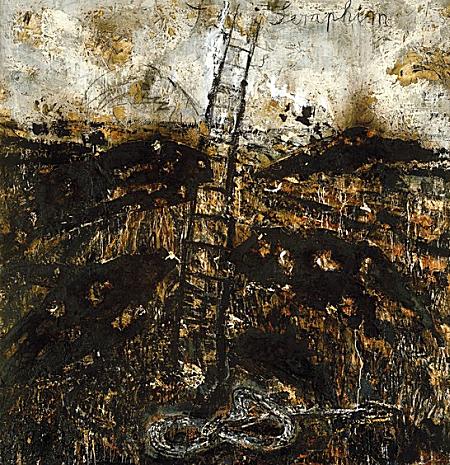
Seraphim
Anselm Kiefer
_______________________
Hakim Bey
In Conversation with Hans Ulrich Obrist
e-flux
HUO: It sounds like these mapping projects have a lot to do with memory. The historian Eric Hobsbawm always speaks about a protest against forgetting, and Rem Koolhaas suggested to me recently that amnesia might be at the very core of the digital revolution. It seems that with more and more information, there might be less and less memory. Would you agree? Has it become urgent now to protest against forgetting?
HB: I think so. I mean, I probably have a much more dire view of cyberspace and the internet than Rem Koolhaas. I think of it as a black hole of memory, and I think memory is disappearing at an alarming rate, thanks to this idea that everyone now has a prosthetic memory. The idea is that this prosthetic memory means that no one needs to remember anything anymore. You just push a button and get any information you want. Well, you first of all need to know what questions to ask. If you don’t even know what you want to know, how can you know it? That’s what I mean about the black hole—it sucks in knowledge. It’s actually worse than forgetting—it works against memory itself....(more)
_______________________
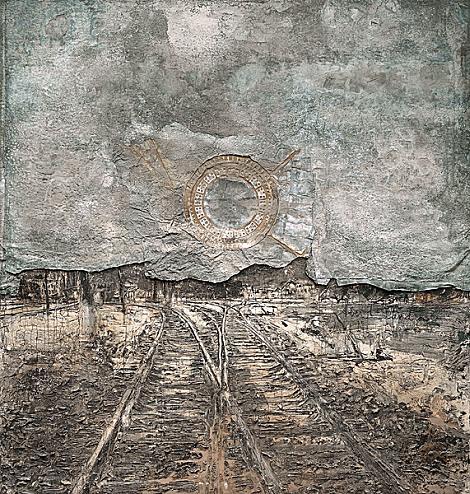
Twilight of the West
[Abendland]
1989
Anselm Kiefer
_______________________
The Value of Being Befuddled, Occasionally.
Or, the Attempt to Live a Life of Constant and Eager Observation
Tom Jacobs
3quarksdaily
(....)
Like all forms of value, aesthetic value derives, as Santayana noted, from the “irrational part of our nature.” Whatever it is we decide to valorize—history, politics, beauty, use, coolness, kitschiness, money—each of these is contingent upon a wide range of “first principles” that are, at root, irrational, based on a desire for a kind of ultimate coherence that can never be fully satisfied. The meaning of these types of engagements with the substance of material culture, however, depends on the historical, cultural, political, and aesthetic forces that converge in the context of the encounter, and on the narratives that shape individual judgment and perception of the event. Concepts, categories, and perhaps even language itself cannot contain or explain the unique somatic power of evocative objects like these. It’s hard not to feel that something else is going on here…something that is either full of wordless meaning or else mystical nonsense.
(....)
It’s not that what is past casts its light on what is present, or what is present its light on what is past; rather, image is that wherein what has been comes together in a flash with the now to form a constellation. In other words, image is dialectics at a standstill. For while the relation of the present to the past is a purely temporal, continuous one, the relation of what-has-been to the now is dialectical: is not progression but image, suddenly emergent. Only dialectical images are genuine—that is, not archaic—images. The image that is read—which is to say, the image in the now of its recognizability—bears to the highest degree the imprint of the perilous critical moment on which all reading is founded.
This, like most of Benjamin’s writing, is both maddeningly and fascinatingly opaque. What I take him to mean is that our normal relation to the past is simple, straightforward, and even prepackaged (one goes to a museum to see old things and sure enough, there they are). But there are moments when the past confronts us with a blow to the gut, when it erupts unexpectedly into the present with the force of a rupture....(more)
_______________________
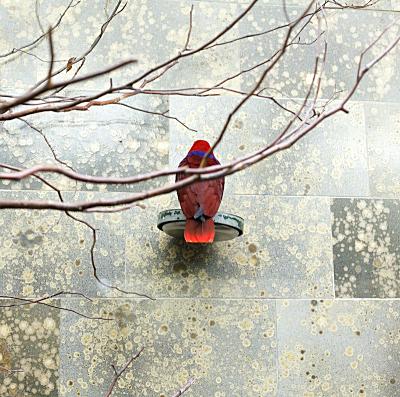
"In Situ"
Eric Pillot
Circulation(s)
Festival de la jeune photographie européenne
_______________________
Orson Welles - The One Man Band (1995)
90 minutes
ubu film
... a fascinating glimpse at this extraordinary man's final years - made with the cooperation of Oja Kodar, Welles' longtime companion, to whom he bequeathed a wealth of unedited films and fragments when he died in 1985. Granted exclusive access to Welles' heretofore unseen archives - and drawing from almost two tons of film cans containing fragments, shorts, project ideas, and sketches - the filmmakers are led by Kodar through the rich but unfulfilled Welles legacy. Far from being the gloomy megalomaniac that Hollywood has sometimes branded him, Welles emerges here a protean creator, at times vulnerable and lonely, but always unshakeably optimistic and unfailingly innovative.
Among the many works included are:
* A hilarious trailer for F For Fake
* Excerpts from The Deep, a thriller set in the Pacific Ocean, starring Jeanne Moreau and Laurence Harvey
* Swinging London, a wacky sketch featuring Welles in drag as a housewife!
* A clip from a one-man show of Moby Dick, with Welles playing all parts sans makeup or costume
* Footage of a charming and self-deprecating Welles meeting with American students after a screening of The Trial ("I use my own work to subsidize my work; in other words, I am crazy!")
* Highlights from The Other Side Of The Wind, the most prestigious production of Welles' later years: it's the story of an aging, egotistical director (played by John Huston) who rails against Hollywood. Shot in a jumpy, frenetic style, it's unlike anything Welles had done before.

The World From My Front Porch
Larry Towell/ Magnum Photos
youtube
_______________________
The Snowbound City
John Haines
I believe in this stalled magnificence,
this churning chaos of traffic,
a beast with broken spine,
its hoarse voice hooded in feathers
and mist; the baffled eyes
wink amber and slowly darken.
Of men and women suddenly walking,
stumbling with little sleighs
in search of Tibetan houses —
dust from a far-off mountain
already whitens their shoulders.
When evening falls in blurred heaps,
a man losing his way among churches
and schoolyards feels under his cold hand
the stone thoughts of that city,
impassable to all but a few children
who went on into the hidden life
of caves and winter fires,
their faces glowing with disaster.

John Haines
(1924 - 2011)
photo - Dan O’Neill
The Twilight Country
The Nature Writing of John Haines
Andrew Frisardi
Friends recall the many sides of John Haines
John Haines - Nine Political Poems
archipelago
.....................................................
"The Flight":
John Haines
It may happen again—this much
I can always believe
when our dawn fills with frightened neighbors
and the ancient car refuses to start.
The gunfire of locks and shutters
echoes next door to the house
left open
for the troops that are certain to come.
We shall leave behind nothing but cemeteries,
and our life like a refugee cart
overturned in the road,
a wheel slowly spinning …
quoted in
The Poetry of John HainesDana Gioia
The introduction to New Poems: 1980-1988 by John Haines
...if I ultimately commend New Poems as a book of unusual artistic maturity, some readers may feel I am damning it with faint praise. Americans are not used to celebrating their poets for maturity. For every Bishop or Ransom in our literature there are a dozen enfants terribles (many of whom continue to be both enfant and terrible into old age). Our culture too often prizes the novel and precocious artist more often than the wise and steady one. Always an uncommon man, Haines is unusual even in his virtues. He has been a slow and serious writer in a culture which celebrates speed and accessibility. Patient and tenacious, he has been more interested in perfecting his work than in popularizing it. New Poems is an uncompromising, often difficult book. But unlike much recent "difficult" art, it is honestly conceived and meticulously executed. If it demands study, it can also bear the weight of scrupulous attention.
But to understand these profound new poems one must turn not only to critical analysis but also to life. Like all genuine poems, they reward close reading, but they—more than most contemporary verse—also repay meditation. Haines' poetry speaks best to someone who appreciates the deep solitude out of which art arises. The attention they require is not so much intellectual as spiritual. To approach this kind of poetry one must trust it, a difficult gesture in an era like ours where so much art is characterized by pretense and vapidity. But Haines' work deserves the reader's trust. These unusual poems make the reader work, but they repay labor with spiritual refreshment. This book is not for everyone, but readers who know poetry can sometimes resemble prayer, will treasure it....(more)
_______________________

Shati Refugee Camp
Gaza Strip
2001
Larry Towell
Stephen Bulger Gallery
_______________________
City of Orphans
John Haines
How strange to think of those streets
and vacant lots, the sandhills
where we played and dug our trenches;
the forts we built, the enemies
we conjured to aim our stick-guns at,
and then went home at evening,
to victory, to safety and sleep.
And now the vast acres of rubble,
the pitched and roofless houses,
upended stonework and sunken bridges.
The dog-packs roaming, digging,
for the one still-unclaimed victim;
the stray sniper aiming at dusk,
and in the roadside fields,
flowers that explode when picked.
The children wandering from one
burned suburb to another,
seeking that which no longer exists:
a neighborhood, a playing field,
a wading pool or a standing swing;
for a kite to fly, a ball to throw,
or just one pigeon to stone.
And through all this haunted vacancy,
from cellars and pits of sand,
come and go as on a fitful wind
such whispers, taunts and pleadings:
the scolding voices of dead parents,
the lessons of teachers no longer
standing, whose classrooms
are blown to ash and smoky air.
And far-off, unheard beyond the drone
of a single hovering aircraft –
in Paris, Zurich, Prague, or London,
the murmur of convening statesmen.
_______________________
What Happens When Pretending to Be Crazy Is a Career Strategy
Paul Krugman
I have said this before, but it’s worth repeating: a large segment of the population in the United States is completely impervious to rational argument and the presentation of evidence. In our country, learned ignorance is on the rise.
Take, for example, an interesting online exchange between Australian economist John Quiggin and Jonathan Chait, a senior editor at The New Republic, with regard to right-wing agnotology — that is, culturally induced ignorance or doubt — in the United States....(more)
_______________________
Distorting the Essence of the Great Arab Revolutions of 2011
Esam Al-Amin
It's Not About the West, Mr. Friedman
_______________________
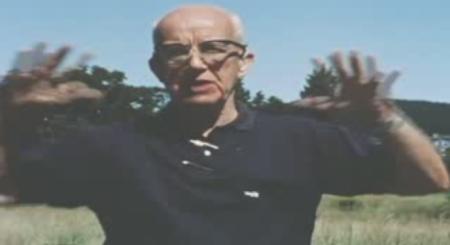
The World of R. Buckmister Fuller
(1974)
ubu film
85 min
_______________________
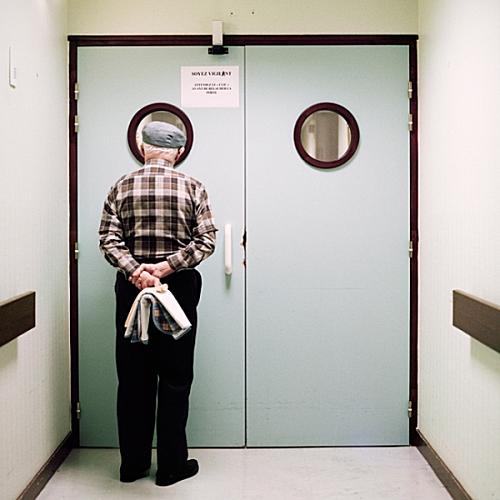
Into Oblivion
Maja Daniels
“The issue is how society, including human services, has chosen to define older people as post-adults living in institutions.” Bruce C. Blaney
(....)While investigating the politics of ageing in modern society, I have for three years photographed life within a geriatric hospital in the northwest of France.
The "Protected Unit" is home to residents with Alzheimer’s disease. Due to tendencies to wander about and potentially get lost, they are confined within the ward. A locked door separates the occupants from the rest of the hospital....(more)
via riley dog
_______________________
David Auerbach reviews Lars Iyer's Spurious
quarterly conversation
(....)
Those who take Spurious the blog, and thus Spurious the book, as a pathetic intellectual burlesque are missing the great complexity offered by each. It is a subtle complexity, obscured by misdirection. But the richness in the book is available to those who let themselves be misdirected and then misdirect themselves. It takes some effort on the part of the reader to unsituate him or herself, however. Because this book does read like a sequence of blog posts on Spurious, and because it plays on the border between fiction and non-fiction like so many blogs, it demands a different sort of reading than one would give a novel that comes with nothing but a name attached. The chorus of Larses in the book, the blog, and Iyer’s interviews speak with greatly overlapping voices. But listen to this chorus of David’s and all will be made clear....(more)
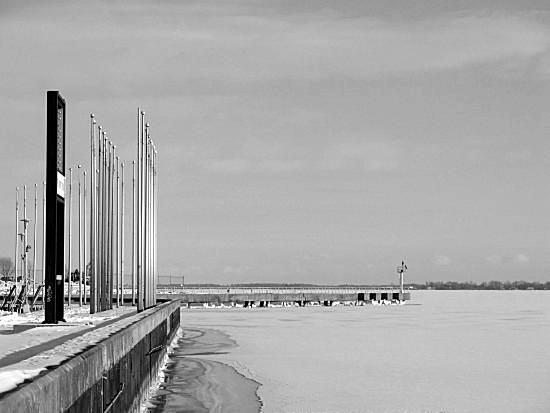
waiting
photo - mw
_______________________
‘What I Really Want Is Someone Rolling Around in the Text’
Sam Anderson
NYT Magazine
Today I rarely read anything — book, magazine, newspaper — without a writing instrument in hand. Books have become my journals, my critical notebooks, my creative outlets. Writing in them is the closest I come to regular meditation; marginalia is — no exaggeration — possibly the most pleasurable thing I do on a daily basis.
(....)
According to the marginalia scholar H. J. Jackson, the golden age of marginalia lasted from roughly 1700 to 1820. The practice, back then, was surprisingly social — people would mark up books for one another as gifts, or give pointedly annotated novels to potential lovers. Old-school marginalia was — to put it into contemporary cultural terms — a kind of slow-motion, long-form Twitter, or a statusless, meaning-soaked Facebook, or an analog, object-based G-chat. (Nevermind: it was social, is my point.) Samuel Taylor Coleridge, the undisputed all-time champion of marginalia, flourished at the tail end of this period, and his friends were always begging him to mark up their books. He eventually published some of his own marginalia, and in the process even popularized the word “marginalia” — a self-consciously pompous Latinism intended to mock the triviality of the form.
It’s probably natural, here in the 21st century, to fret over the future of literature — to worry that, in an era in which everyone wants everything to be social and interactive, serious reading will be impossible. Yet books are curious objects: their strength is to be both intensely private and intensely social — and marginalia is a natural bridge between these two states. It might end up serving equally well as a bridge between online and literary culture, between focus and distraction: a point of contact that could improve both without hurting either. Digital technology, rather than destroying the tradition of marginalia, could actually help us return it to its gloriously social 18th-century roots. ...(more)
_______________________

photo - mw
_______________________
Those Who Do Not Remember History
driftglass
Will have long and profitable careers as Neoconservative war pimps.
(....)
...we now live in a country where there is no penalty whatsoever for Conservatives who are grotesquely and serially wrong about matters of life and death. And so well-paid buffoons like Brooks have no incentive to learn the lessons of Iraq that other, less-privileged citizens have paid for with their lives. Instead, he and his ilk are left with their lives, fortunes and positions of power in American politics and media blissfully untouched, free to whitewash their failures over and over again, unmolested by the inconvenient realities of the pain and ruin they left in their wake....(more)
_______________________
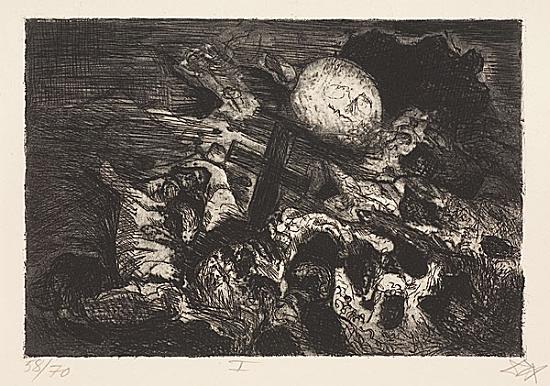
Soldier's grave
between the lines
Otto Dix
Otto Dix’s War Sketches
David Auerbach
Waggish
_______________________
OCTOPUS MAGAZINE #14
It Is Especially Dangerous To Be Conscious Of Oneself
Jeff Alessandrelli
Then we enter a low, ponderous country
where the clouds are a series of disparate thoughts
and the rain they insist on reasoning with
a celebration of their hectic musings.
The men are watering the streets anyways.
Luminous, just-fresh, the concrete sparkles;
gum stains and spit stains and every veritable crack.
Do they still call mirrors looking glasses anymore?
Those type of tempered thoughts.
Yo I’m lazy but I’m crazy too
You never know what I definitely might do
threatens the radio, mass-eyed and alert.
Up ahead the mirage is steady and punctual.
We’re waiting for a war to begin
or a delectable sweet to eat after lunch.
...(more)
_______________________

photo - mw
_______________________
“What we think is secondhand, what we experience is chaotic, what we are is unclear.
We don’t have to be ashamed, but we are nothing, and we earn nothing but chaos.
In my name and in the name of those here who have also been selected by the jury, I thank all of you.”
-
Thomas Bernhard in a speech on the occasion of the awarding of the (little) Austrian State Prize. Notes Toward an Understanding of Thomas Bernarhd
E.J. Van Lanen
Quarterly Conversation
_______________________
I am a nihilist because I still believe in truth
Ray Brassier interviewed by Marcin Rychter
kronos
Like Nietzsche, I think nihilism is a consequence of the ‘will to truth’. But unlike Nietzsche, I do not think nihilism culminates in the claim that there is no truth. Nietzsche conflated truth with meaning, and concluded that since the latter is always a result of human artifice, the former is nothing but a matter of convention. However, once truth is dismissed, all that remains is the difference between empowering and disempowering fictions, where ‘life’ is the fundamental source of empowerment and the ultimate arbiter of the difference between life-enhancing and life-depreciating fictions. Since the abandonment of truth undermines the reason for relinquishing illusion, it ends up licensing the concoction of further fictional narratives, the only requirement for which is that they prove to be ‘life-enhancing’.
I consider myself a nihilist precisely to the extent that I refuse this Nietzschean solution and continue to believe in the difference between truth and falsity, reality and appearance. In other words, I am a nihilist precisely because I still believe in truth, unlike those whose triumph over nihilism is won at the cost of sacrificing truth. I think that it is possible to understand the meaninglessness of existence, and that this capacity to understand meaning as a regional or bounded phenomenon marks a fundamental progress in cognition.
As for nihilism and religion: well, religion’s rational credibility can be rebuked without evoking modern science or nihilism: Democritus and Epicurus did so over two thousand years ago, using arguments that are still valid today, even if theists prefer to ignore them. But of course, the irrationality of religious belief has never impeded its flourishing; indeed, it is precisely what immunizes it against rational refutation, since religion is designed to satisfy psychological needs, not rational requirements. Marx was right: religion will never be eradicated until the need for it evaporates. Obviously, this evaporation will have to be accomplished practically as well as cognitively.
I have not read Meillassoux’s L’inexistence divine so do not know what sorts of arguments he adduces to legitimate the hypothesis of an inexistent ‘God-to-come’. I am sure they will be exceptionally ingenious. But I remain skeptical, since I see no need for any such hypothesis. Indeed, I view this continuing philosophical fascination with monotheism as deeply pernicious and think a moratorium ought to be declared to prevent any further ‘God talk’ by philosophers. I do not think it mere coincidence that the critique of scientific rationality in much 20th century philosophy goes hand in hand with a revival of theological themes. Religion obviously satisfies deep-seated human needs, but it has been a cognitive catastrophe that has continually impeded epistemic progress—contrary to the pernicious revisionism that claims monotheism was always on the side of science and truth. Human knowledge has progressed in spite of religion, never because of it. Philosophers should simply have no truck with it....(more)
_______________________

photo - mw
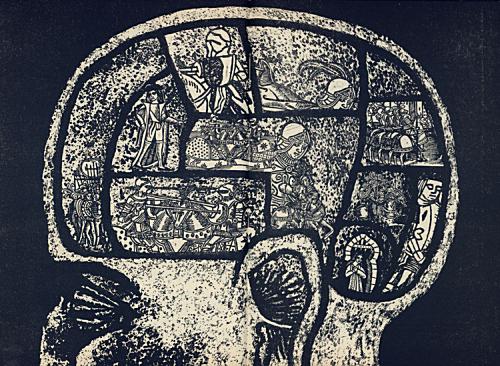
Facts are the enemy of truth
Illustrations by Roberto Paez for Don Quixote
(Buenos Aires, 1969)
presented by Will Schofield
but does it float
_______________________
Regulators Reject Proposal That Would Bring Fox-Style News to Canada
Robert F. Kennedy Jr.
Fox News will not be moving into Canada after all! The reason: Canada regulators announced last week they would reject efforts by Canada's right wing Prime Minister, Stephen Harper, to repeal a law that forbids lying on broadcast news.(....)
Harper, often referred to as "George W. Bush's Mini Me," is known for having mounted a Bush like war on government scientists, data collectors, transparency, and enlightenment in general. He is a wizard of all the familiar tools of demagoguery; false patriotism, bigotry, fear, selfishness and belligerent religiosity.
Harper's attempts to make lying legal on Canadian television is a stark admission that right wing political ideology can only dominate national debate through dishonest propaganda. Since corporate profit-taking is not an attractive vessel for populism, a political party or broadcast network that makes itself the tool of corporate and financial elites must lie to make its agenda popular with the public. In the Unites States, Fox News and talk radio, the sock puppets of billionaires and corporate robber barons have become the masters of propaganda and distortion on the public airwaves. Fox News's notoriously biased and dishonest coverage of the Wisconsin's protests is a prime example of the brand of news coverage Canada has smartly avoided....(more)
_______________________
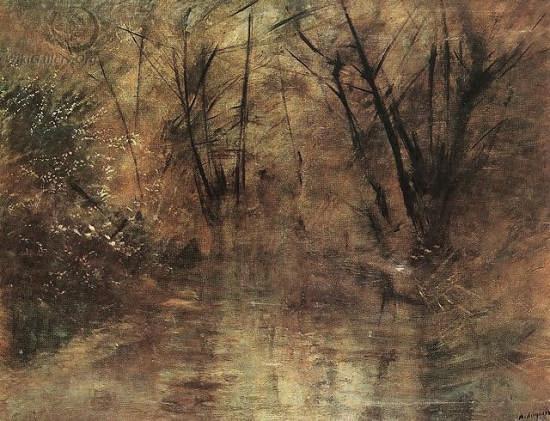
Lįszló Mednyįnszky
1852 - 1919
_______________________
The truth about trees
Dave Bonta
Via Negativa
Some trees are agoraphobic — it’s true. With every branch and twig they strain to block out the sky, and they never leave the forest. Winter is painful for them, but they escape as best they can by drawing down their sap and hiding underground. On warm days in late winter and early spring, when their sap starts to flow again, they are groggy as sleepwalkers that have just fallen down the stairs. ...(more)
_______________________
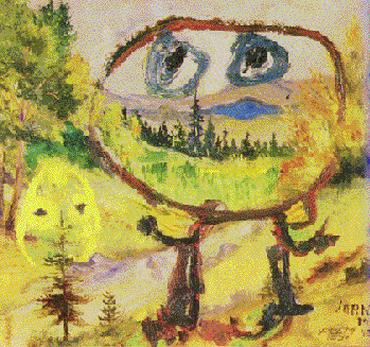
Temptation
1960
The 'Defigurations'
Asger Jorn
b. March 3, 1914
Asger Jorn
Snakes & Ladders
Carter Ratcliff on the legacy of COBRA
Tate Magazine _______________________
Kosti’s Words
Richard Kostelanetz
E·ratio 14 · 2011
Anagroping—scrambled sexual foreplay, usually in darkness, unless participants are very drunk or stoned.
Boozo—a stupid drunk.
Confabulation—a deceptive story.
Currode—making a wolf disintergrate.
Dialectable—susceptible to a certain style of antithetical intellectual analysis.
Earnest—someone who takes a job to acquire enough money to purchase his own home.
Earsighted—someone who hears better than they see.
Elsewhen—another time.
...(more)
Richard Kostelanetz
_______________________
Wind
Tom Clark
(....)
choruses of ancestors in the blood
crying out silent mystery into empty
aisles in an immense theatre, dwindled dark stage,
life of city going on outside extrapolated
from unceasing traffic in wind and rain beginning
day beyond.
...(more)
_______________________
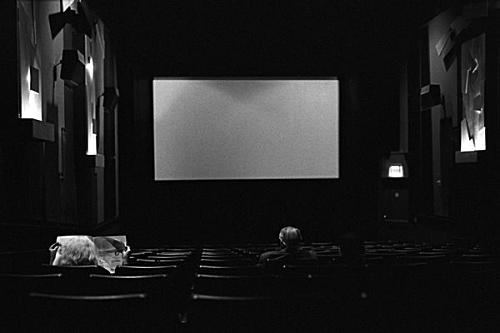
Embarcadero Cinema, 2007
Gray City
George LeChat
hiding in plain sight
_______________________
UbuWeb Top Ten for March 2011, selected by John Zorn
_______________________
Yoko Ono & John Lennon
audio in Aspen no. 7 1970
_______________________
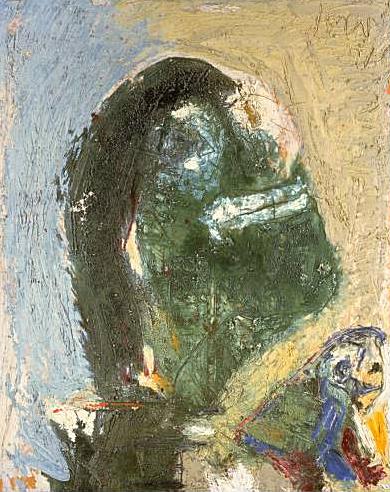
The Timid Proud One
Asger Jorn
1957
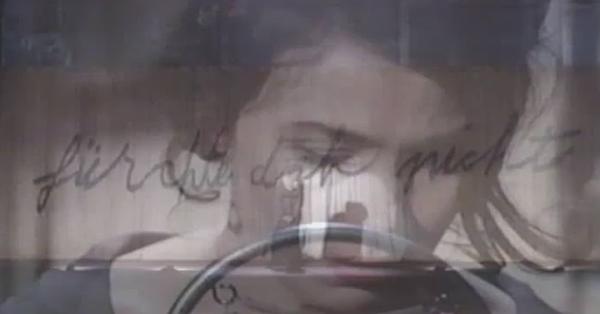
Mary Margaret O'Hara - Don't be Afraid
Betty Carter sings Lonely House
William S Burroughs reads What Keeps Mankind Alive?
Nick Cave sings Mack the Knife
The Music of Kurt Weill: September Songs
youtube clips
.....................................................
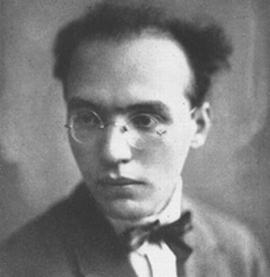
Kurt Weill
b. March 2, 1900
_______________________
Anxiety as Atavism
Dylan Trigg
Side Effects
(....)From the wilderness of prehistoric Africa to the aisles of urban supermarkets, the human’s "phylogenetically endowed" (Freud) anxieties materializes as remnants of a lost world. All that has (largely) changed from the Stone Age is the objective absence of danger: what remains in place is the body’s attunement to threat, its commitment to fight or flight in the face of a threat that is no longer there. Heidegger was right on one thing, therefore: anxiety discloses the fact that not-being-at-home is primordial. Only his neglect of the body led his reason astray. The anxious body is the principle manifestation of a body that is responsive to a phantom world, stored deep in the anonymous structure of its genetic history and thus resistant to cultural and sociological changes, yet never immediately accessible to the experiencing self. For the phobic, anxiety is an outgrowth of a response that no longer serves any strict purpose. To phrase phobia as a “pathology,” therefore, is patently absurd: it is not that the experience of phobia or panic is somehow “irrational” or “illegitimate.” Rather, if “healthy” anxiety corresponds to tangible threat, then what is “atypical” about phobic anxiety is that it corresponds to a no longer existing world. This is the uncanniness of the uncanny body: uncanny because the experience of anxiety is both of the body but simultaneously other than the body....(more)
_______________________
 ca. 1911
Roy C. Andrews Photographs
University of Oregon Photograph Collection
_______________________
Unsolving the City: An Interview with China Miéville
Geoff Manaugh
BLDGBLOG
(....)
Novelists have an endless drive to aestheticize and to complicate. I know there’s a very strong tradition—a tradition in which I write, myself—about the decoding of the city. Thomas de Quincey, Michael Moorcock, Alan Moore, Neil Gaiman, Iain Sinclair—that type-thing. The idea that, if you draw the right lines across the city, you’ll find its Kabbalistic heart and so on.
The thing about that is that it’s intoxicating—but it’s also bullshit. It’s bullshit and it’s paranoia—and it’s paranoia in a kind of literal sense, in that it’s a totalizing project. As long as you’re constantly aware of that, at an aesthetic level, then it’s not necessarily a problem; you’re part of a process of urban mythologization, just like James Joyce was, I suppose. But the sense that this notion of uncovering—of taking a scalpel to the city and uncovering the dark truth—is actually real, or that it actually solves anything, and is anything other than an aesthetic sleight of hand, can be quite misleading, and possibly even worse than that. To the extent that those texts do solve anything, they only solve mysteries that they created in the first place, which they scrawled over the map of a mucky contingent mess of history called the city. They scrawled a big question mark over it and then they solved it. ...(more)
_______________________

Cape Disappointment
Fort Canby, Washington
at the mouth of the Columbia River
John Fletcher Ford
1910
Gerald W. Williams Collection
Oregon Digital
_______________________
Words without Borders
March 2011: At the Movies
(Bleep), You (Bleeping) (Bleep):
Dubbing American Films into Canadian French
Robert Paquin
The full quote is: “(Bleep), you (bleep) (bleep), I’m ‘onna (bleep) kick your (bleep) (bleep) to (bleep) kingdom come!” This is a typical excerpt from the dialogue of an American movie. How do you translate this for dubbing into French? There’s the word (bleep), the word (bleep), the word (bleep), and the word (bleep), not to mention all the others you’ll hear in the rest of the film. In English they are usually called four-letter words, but sometimes the mother steps in and the number of letters increases.
There are many problems. Let‘s look at them and then discuss the solutions. First, you have to be aware that when you’re dubbing—we’re talking synchronized dubbing here—the key word is synchronize. There are three kinds of synchronicity: there’s phonetic synchronicity, semantic synchronicity, and dramatic synchronicity....(more)
_______________________
Crossing
Habib Tengour
Translated from FrenchFrench by Marilyn Hacker
words without borders
(....)
When I speak with them today they have forgotten the bad luck
interrogations at the border raids in the subway.
Truckloads of trouble!
They’ve ended up old in a squared-off suburb.
The children don’t answer their phone calls
the grandchildren are aphasic.
Memory’s kept up by an audio-tape in the mail.
They chose nothing.
They come and go
by plane now
impotent
nostalgic
endlessly stepping back
arguments abound and excuses
are always good ones
the definitive crossing.
Amnesiac alien
being integrated inlaid into absence
exile is a fake leather armchair
it’s unheard speech
ritual mutilation
atavistic difference
a gene
transmission of thought
a painless index card
then
everything you never thought of in your distraction
(preoccupied with having a house back home)
falls on your head
the flood
...(more)
_______________________
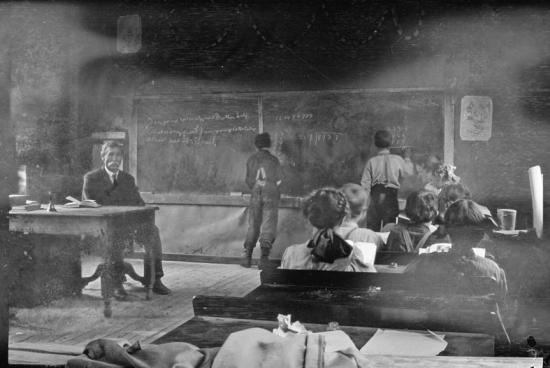
Le Bleu school
Roy C Andrews
ca. 1911
_______________________
Coda
Basil Bunting
A strong song tows
us, long earsick.
Blind, we follow
rain slant, spray flick
to fields we do not know.
Night, float us.
Offshore wind, shout,
ask the sea
what’s lost, what’s left,
what horn sunk,
what crown adrift.
Where we are who knows
of kings who sup
while day fails? Who,
swinging his axe
to fell kings, guesses
where we go?
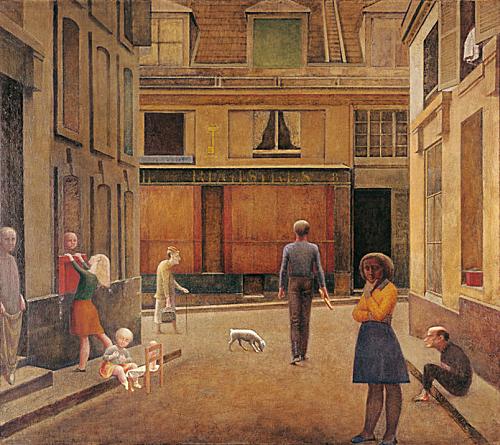
Passage du Commerce-Saint-André
1952-54
Balthus
February 29, 1908 – February 18, 2001
_______________________
Briggflatts - Part I
Basil Bunting
(....)
Gentle generous voices weave
over bare night
words to confirm and delight
till bird dawn.
Rainwater from the butt
she fetches and flannel
to wash him inch by inch,
kissing the pebbles.
Shining slowworm part of the marvel.
The mason stirs:
Words!
Pens are too light.
Take a chisel to write.
Every birth a crime,
every sentence life.
Wiped of mould and mites
would the ball run true?
No hope of going back.
Hounds falter and stray,
shame deflects the pen.
Love murdered neither bleeds nor stifles
but jogs the draftsman’s elbow.
What can he, changed, tell
her, changed, perhaps dead?
Delight dwindles. Blame
stays the same.
Brief words are hard to find,
shapes to carve and discard:
Bloodaxe, king of York,
king of Dublin, king of Orkney.
Take no notice of tears;
letter the stone to stand
over love laid aside lest
insufferable happiness impede
flight to Stainmore,
to trace
lark, mallet,
becks, flocks
and axe knocks.
Dung will not soil the slowworm’s
mosaic. ......(more)
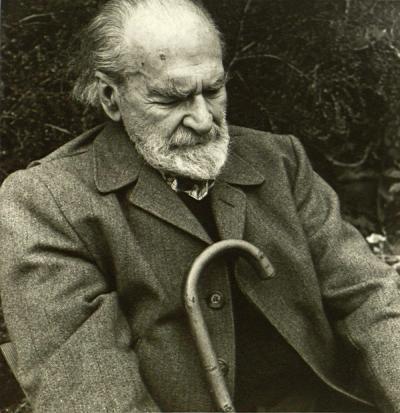
Basil Bunting
(1 March 1900 – 17 April 1985)
photo by Jonathan Williams.
Basil Bunting Poetry Centre
Complete Poems
Basil Bunting
google books
The Star You Steer By: Basil Bunting and British Modernism
edited by James McGonigal, Richard Price
google books
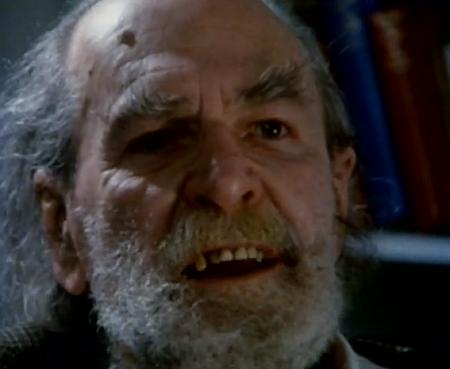
Basil Bunting reading
excerpts fromBriggflatts
youtube
Basil Bunting reading Briggflatts Part IV, Coda and Pound's Canto I
more at PennSound
from Odes: 36
Basil Bunting
See! Their verses are laid
as mosaic gold to gold
gold to lapis lazuli
white marble to porphyry
stone shouldering stone, the dice
polished alike, there is
no cement seen and no gap
between stones as the frieze strides
to the impending apse:
the rays of many glories
forced to its focus forming
a glory neither of stone
nor metal, neither of words
nor verses, but of the light
shining upon no substance;
a glory not made
for which all else was made.
_______________________
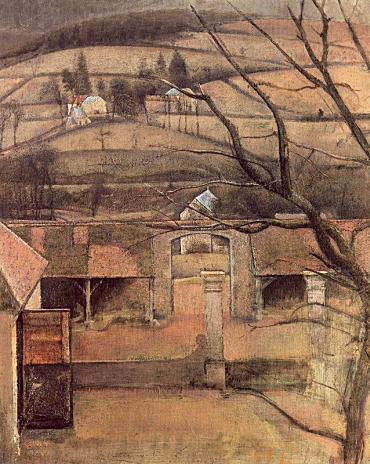
Paysage de Chassy
Balthus
1954
_______________________
A Note on Basil Bunting
Robert Creeley
I am curious to know if an implicit quality of language occurs when words are used in a situation peculiar to their own history. History , however, may be an awkward term, since it might well imply only a respectful attention on the part of the writer rather than the implicit rapport between words and man when both are equivalent effects of time and place. In this sense there is a lovely dense sensuousness to Bunting's poetry, and it is as much the nature of the words as the nature of the man who makes use of them. Again it is a circumstance shared.
I am caught by the sense of himself Bunting defines:
I hear Aneurin number the dead and rejoice,
being adult male of a merciless species.
Today's posts are piles to drive into the quaggy past
on which impermanent palaces balance.
(Briggflatts )
It is the hierarchal situation of poet going deeper in time than one could borrow or assume, and hence the issue of some privileged kinship with the nature of poetry itself in one's own language. Pound's "heave," with the trochee, proved him sensitive to it and makes clear one aspect of the relation between Bunting and himself. Bunting, from the earliest poems in Loquitur to the greatness of Briggflatts itself, is closely within the peculiar nature of his given language, an English such as one rarely now hears. In the earlier poems he makes use of a Latin, call it, appropriately enough:
Narciss, my numerous cancellations prefer
slow limpness in the damp dustbins amongst the peel
tobacco-ash and ends spittoon lickings litter
of labels dry corks breakages and a great deal
of miscellaneous garbage picked over by
covetous dustmen and Salvation Army sneaks
to one review-rid month's printed ignominy,
the public detection of your decay, that reeks.
("To a Poet who advised me to
preserve my fragments and false starts")
But the insistent intimate nature of his work moves in the closeness of monosyllables, with a music made of their singleness:
Mist sets lace of frost
on rock for the tide to mangle.
Day is wreathed in what summer lost.
(Briggflatts )
Presumptuously or not, it seems to me a long time since English verse had such an English ear—as sturdy as its words, and from the same occasion.
The Collected Essays of Robert Creeley
University of California Press E-Books Collection
|

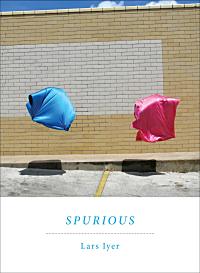


 The Age of Briggs & Stratton
The Age of Briggs & Stratton













































